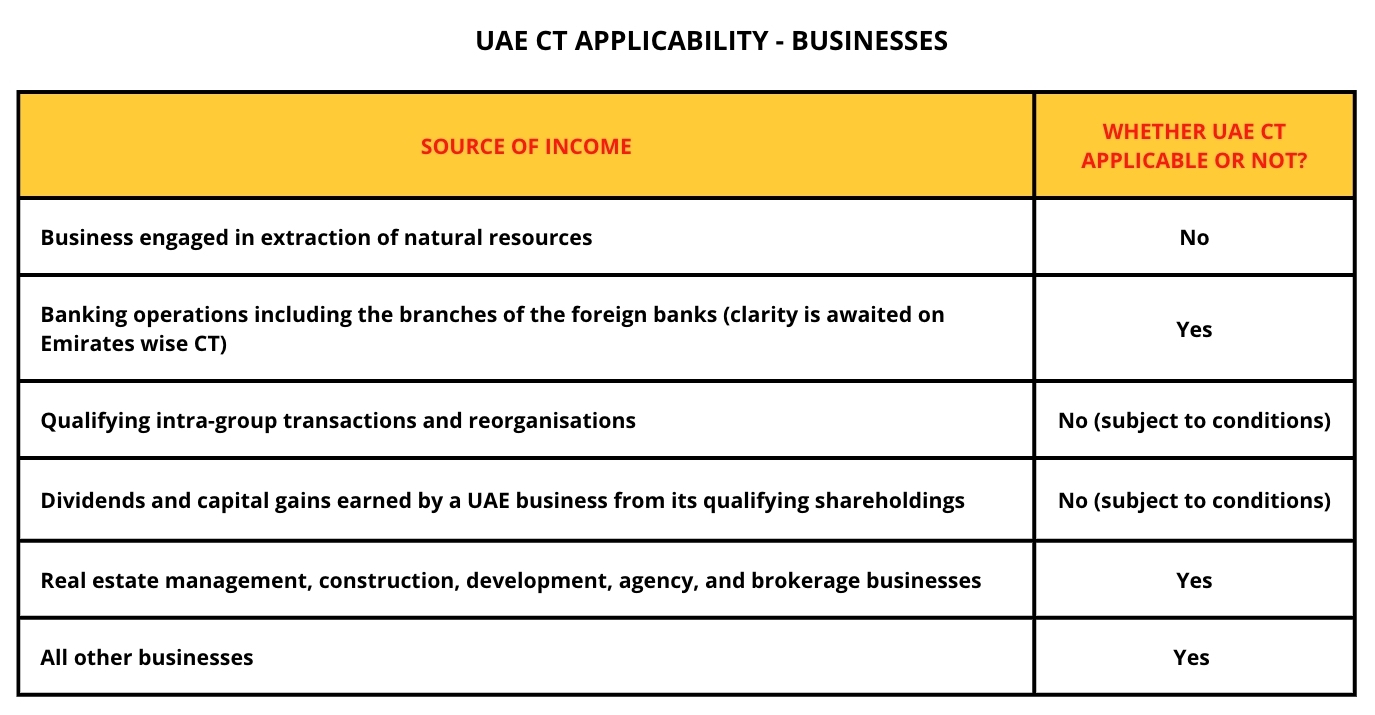Corporate Tax
Corporate tax is a form of direct tax levied on the net income or profit of corporations and other entities from their business. Corporate tax is sometimes also referred to as “Corporate Income Tax” or “Business Profits Tax” in other jurisdictions.
Corporate Tax in UAE – A brief background
 On 31 January 2022, the tax aspect of the region shifted with the United Arab Emirates (UAE), Ministry of Finance (MoF) making an announcement in the right direction that a new federal corporate tax (CT) system will be implemented in the UAE, effective financial years commencing on or after 1 June 2023. Across GCC economies, the corporate tax (CT) structure is as follows: Qatar charges 10 per cent, Kuwait and Oman charge 15 per cent and Saudi Arabia charges 20%. Barring Bahrain which is yet to take a call on corporate tax, the UAE has introduced the lowest corporate income tax rate in the region at a standard rate of 9%.
On 31 January 2022, the tax aspect of the region shifted with the United Arab Emirates (UAE), Ministry of Finance (MoF) making an announcement in the right direction that a new federal corporate tax (CT) system will be implemented in the UAE, effective financial years commencing on or after 1 June 2023. Across GCC economies, the corporate tax (CT) structure is as follows: Qatar charges 10 per cent, Kuwait and Oman charge 15 per cent and Saudi Arabia charges 20%. Barring Bahrain which is yet to take a call on corporate tax, the UAE has introduced the lowest corporate income tax rate in the region at a standard rate of 9%.
The UAE CT regime has been designed to incorporate best practices globally and minimize the compliance burden on businesses.
UAE intended to introduce a competitive CT regime based on international best practices that will cement the UAE’s position as a leading global hub for business and investment, and accelerate the UAE’s development and transformation to achieve its strategic objectives. Introduction of a CT regime reaffirms the UAE’s commitment to meeting international standards for tax transparency and preventing harmful tax practices.
Effective date of implementation
Corporate Tax will apply in the country for financial years starting on or after June 1, 2023.
For example: –
Businesses whose financial year begins on July 1,2023 and ends on June 30, 2024 will be subject to corporate tax in the UAE from July 1,2023 (which is the start of the first financial year starting on or after June 1, 2023).
Businesses whose financial year begins on April 1, 2023 and ends on March 31,2024 will subject to corporate tax in the UAE from April 1, 2024 (which is the start of the first financial year starting on or after June 1, 2023).
Exception from Corporate Tax:
- The UAE Federal/Emirate Government and their department, authorities or other public institution.
- A wholly Government-owned UAE company that carries out a sovereign or mandated activity and that is listed in a cabinet decision.
- A business engaged in the extraction and exploitation of UAE natural resources that is subject to Emirate-level taxation.
- A charity or another public benefit organisation that is listed in a Cabinet Decision.
- A public or regulated private social security or retirement pension fund.
- A regulated investment fund that has applied for an CT exemption.
Corporate Tax rates calculation:
The announced UAE CT regime introduces a tier system with 3 rates:
- All annual taxable profits that fall under AED 375,000 shall be subject to zero rate.
- All annual taxable profits above AED 375,000 shall be subject to 9% rate.
- ALL MNEs that fall under the scope of Pillar 2 of the BEPS 2.0 framework (i.e. consolidated global revenues in excess of AED 3.15 billion) shall be subject to different rates as per OECD Base Erosion and Profit-Sharing rules.
Taxable profits are the accounting profits subject to certain adjustments.
Corporate tax applicability to the companies in Free Zones:
Corporate tax law is going to be applicable for all the companies registered in UAE including the free zones in UAE. Corporate tax will be levied at zero percent on the taxable income (adjusted net profit) of the businesses in the free zones as long as they comply with all the regulations of the respective free zone and do not do any business with the mainland companies, otherwise there is a possibility of levying 9% corporate tax on the taxable income (adjusted net profit) in excess of AED 375,000. Hence companies in the Free Zones need to make sure that they are complying with all the regulations of the free zone and do not do any business with the mainland entities to enjoy the benefit of zero percentage of UAE corporate tax.
Transfer Pricing Rules
The OECD Transfer Pricing Rules shall now be applicable in the UAE. All companies have to comply with the Transfer Pricing rules and documentation requirements. These transfer pricing rules will now become mandatory and may also be applicable to domestic transactions.
While intercompany sales and financing services are common practice amongst UAE groups, previously remuneration for these activities has not been on the forefront given the transactions would likely be eliminated upon financial consolidation.
This is a game changer as intercompany transactions would need to be undertaken at arm’s length and generally should be supported by appropriate documentation. Businesses would need to evaluate their current arrangements and assess the impact on both cross-border as well as domestic transactions.


How Spectrum Auditing can help you?
Reach out to Spectrum Auditing for any details pertaining to UAE Corporate Tax. Call us today for any kind of assistance at +971 4 2699329 or email [email protected] to get all your queries addressed. Spectrum is your partner in your success.

 contact us
contact us